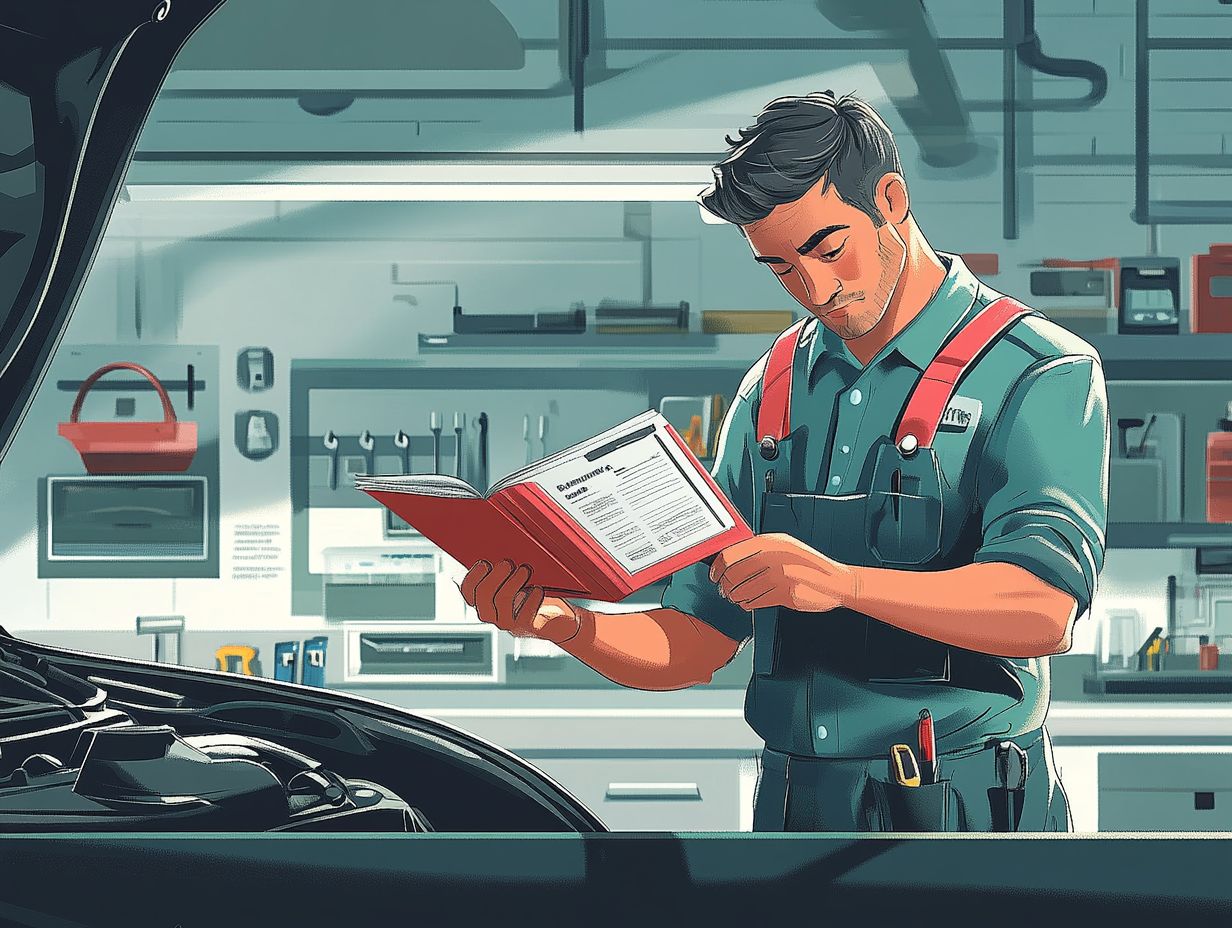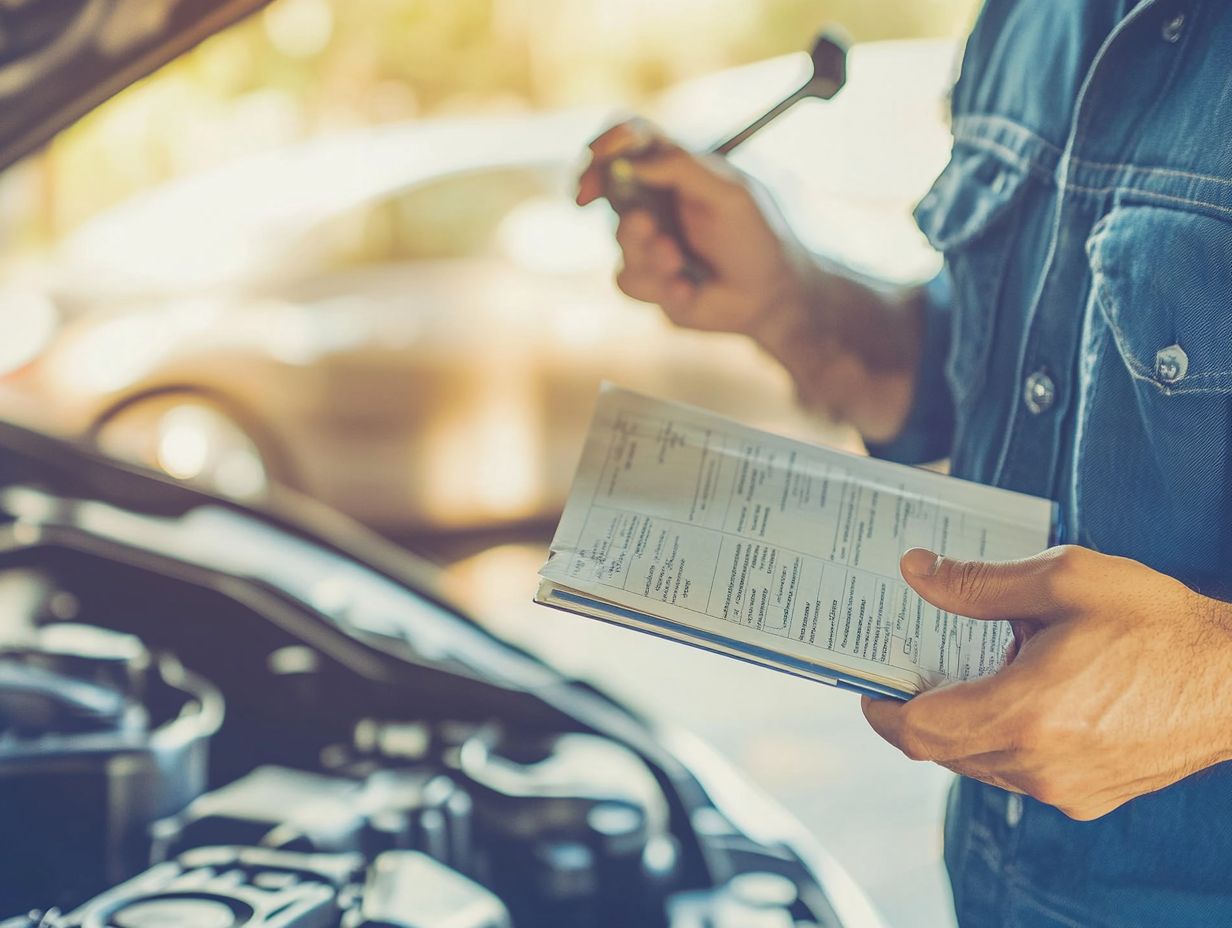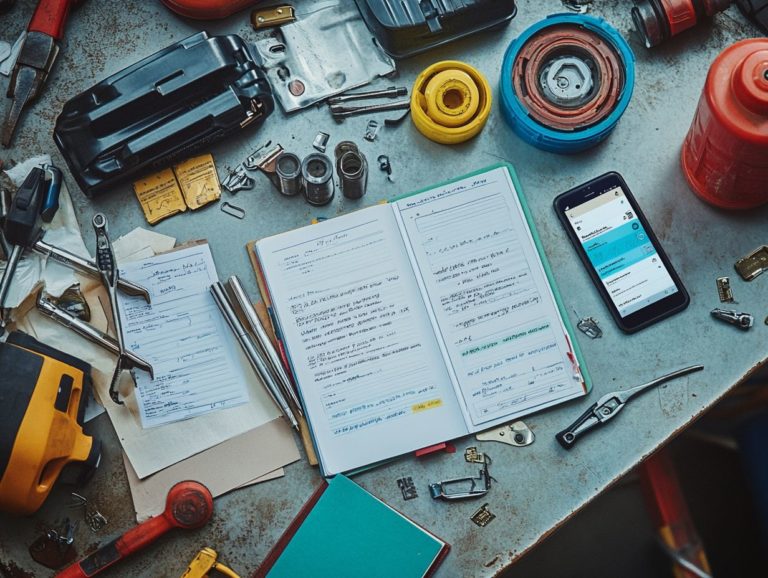Understanding Your Car’s Maintenance Schedule
Maintaining your vehicle goes beyond just ensuring it runs smoothly; it’s a proactive strategy to extend its lifespan and enhance your safety on the road. Let’s explore why following a maintenance schedule is a game changer for your car!
This article highlights the critical importance of sticking to a maintenance schedule. You’ll discover the essential components of a well-rounded maintenance plan, learn how to decipher your vehicle s manual, and find out how to create a personalized schedule that suits your specific needs.
We ll also address common misconceptions that could lead you astray. Prepare to hit the road with renewed confidence!
Contents
- Key Takeaways:
- Why Follow a Maintenance Schedule?
- Components of a Maintenance Schedule
- Understanding Your Car’s Manual
- Creating a Personalized Maintenance Schedule
- Common Misconceptions About Car Maintenance
- Frequently Asked Questions
- What is a car’s maintenance schedule?
- Why is it important to understand my car’s maintenance schedule?
- How often should I refer to my car’s maintenance schedule?
- What types of maintenance tasks are typically included in a car’s maintenance schedule?
- Can I deviate from my car’s maintenance schedule?
- What are the consequences of not following my car’s maintenance schedule?
Key Takeaways:

- Regular maintenance can save you time and money in the long run by preventing costly repairs and breakdowns.
- Familiarize yourself with your vehicle’s maintenance schedule and manual to understand which tasks are necessary for optimal performance.
- Personalize your maintenance schedule based on your vehicle’s needs, driving habits, and manufacturer recommendations for optimal results.
Why Follow a Maintenance Schedule?
Following a maintenance schedule for your vehicle is crucial to ensure its longevity, reliability, and optimal performance. A well-structured maintenance plan helps you identify potential issues before they escalate, minimizing the risk of engine problems.
By ensuring that essential tasks like oil changes, tire pressure checks, and coolant level inspections are performed on time, you’re taking a proactive approach. This not only enhances your vehicle’s lifespan but also contributes to safer driving experiences by keeping it in top-notch condition.
A consistent maintenance routine can also improve your vehicle’s resale value by establishing a robust history of diligent upkeep.
Benefits of Regular Maintenance
Regular maintenance brings a wealth of benefits, including enhanced safety, a longer lifespan, and improved performance. By consistently changing your oil and keeping an eye on coolant levels, you can sidestep potential engine issues.
Paying attention to your transmission fluid the fluid that helps your car change gears smoothly is essential for maintaining peak functionality. This fluid directly impacts shifting smoothness and overall drivability, ensuring every ride feels effortless.
This careful approach boosts fuel efficiency. You’ll enjoy better mileage and save money at the pump, while also building a strong maintenance history that shows your vehicle has been well cared for. A vehicle with a documented maintenance record is often viewed as more reliable, enhancing its resale value.
By prioritizing these maintenance routines, you can enjoy a safer and more dependable driving experience for years to come.
Components of a Maintenance Schedule
A comprehensive maintenance schedule encompasses several vital components essential for achieving your vehicle’s optimal performance and longevity. Key elements like regular oil changes, regularly checking tire pressure, and routine checks of coolant levels are paramount.
Incorporating periodic replacements of air filters and spark plugs creates a thorough vehicle maintenance checklist that ensures your vehicle remains in peak condition throughout its lifespan.
Types of Maintenance Tasks

Various types of maintenance tasks are important for your vehicle’s health and performance. Routine tasks like oil changes, tire rotations, and spark plug replacements are the foundation of effective car maintenance.
Regular inspections and coolant level checks enhance the lifespan of vital parts and boost your safety on the road. For example, consistent brake inspections ensure reliable stopping power.
Checking fluid levels, such as transmission fluid and brake fluid, minimizes the risk of mechanical failures. Changing air filters keeps your engine running smoothly, which directly impacts fuel consumption.
Stick to a solid maintenance schedule to enjoy optimal performance and reliability. This practice ensures a safer driving experience and helps you avoid costly repairs.
Understanding Your Car’s Manual
Knowing your car’s manual is vital for effective maintenance, as it helps you stay aligned with the manufacturer’s recommended schedule. For a deeper insight, refer to our guide on understanding your car’s service manual.
Your manual contains crucial details like service intervals, your VIN, and complete maintenance reports. Each piece guides you through essential tasks to help your car run at its best.
Interpreting Maintenance Recommendations
Understanding your vehicle’s maintenance recommendations is key to its longevity and performance. Knowing service intervals and essential tasks, like oil changes and tire rotations, ensures your car stays in top shape.
With a good grasp of these guidelines, you can make informed decisions that enhance your car s efficiency and safety. Sticking to the oil change schedule keeps your engine properly lubricated and extends its lifespan.
Regular tire rotations lead to better fuel economy and safer handling. Following these recommendations results in improved acceleration and fewer unexpected breakdowns for a smoother ride.
Creating a Personalized Maintenance Schedule
Crafting a personalized maintenance schedule for your vehicle is crucial for optimal performance and longevity. Assess your vehicle’s history and make a detailed maintenance checklist to set the right service intervals.
This proactive approach keeps your car in peak condition, ensuring an excellent driving experience.
Factors to Consider

When crafting your maintenance schedule, consider key factors to keep your vehicle in top shape. Reflect on your vehicle’s history, driving conditions, and the manufacturer’s recommended service intervals.
Your driving habits matter; frequent short trips can strain the engine more than longer drives. Also, consider the climate extreme temperatures can affect battery life and tire performance.
The age of your vehicle is also important; older models may need more frequent checks and part replacements. By considering all these factors, you can create a comprehensive maintenance plan that ensures your vehicle remains reliable and efficient.
Common Misconceptions About Car Maintenance
Common misconceptions about car maintenance can lead you to neglect essential care for your vehicle. You might think that if your car is running smoothly, oil changes aren’t necessary.
In reality, maintaining your vehicle is crucial for its longevity and performance.
Debunking Myths and Misinformation
Debunking myths and misinformation in car maintenance is vital for responsible vehicle ownership. Some believe that tasks like regular vehicle inspections and oil changes are optional, but they are critical for your vehicle’s safety and performance.
Ignoring these fundamental practices can lead to severe consequences, such as engine damage or braking failures. These issues could jeopardize not just your safety but also that of others on the road.
Another common misconception is that premium fuel is necessary for all cars. In truth, most cars operate perfectly well on regular gasoline. Using higher octane fuel does not universally enhance performance.
Some owners might think that having a vehicle warranty means routine maintenance is no longer necessary. However, neglecting these tasks can actually void your coverage.
To keep your vehicle reliable and safe, prioritize regular car care and frequent assessments.
Frequently Asked Questions
What is a car’s maintenance schedule?

A car’s maintenance schedule is a recommended plan for regular maintenance tasks that should be performed on a vehicle to keep it running smoothly and extend its lifespan.
Why is it important to understand my car’s maintenance schedule?
Understanding your car’s maintenance schedule is crucial. It helps you keep track of when specific tasks need to be done, preventing costly repairs and ensuring your vehicle’s overall health. For more detailed insights, check out understanding your car’s warranty and maintenance.
How often should I refer to my car’s maintenance schedule?
Refer to your car’s maintenance schedule every 3,000-5,000 miles or every 3-6 months, depending on your vehicle’s make and model. You can also consult your owner’s manual for specific recommendations.
What types of maintenance tasks are typically included in a car’s maintenance schedule?
Common maintenance tasks included in a car’s schedule are oil changes, tire rotations, brake inspections, fluid checks and changes, and filter replacements.
Can I deviate from my car’s maintenance schedule?
In some cases, it may be necessary to deviate from your car’s maintenance schedule, especially if you have a high mileage vehicle or frequently drive in extreme weather conditions. Always consult with a mechanic for personalized recommendations.
What are the consequences of not following my car’s maintenance schedule?
Not following your car’s maintenance schedule can result in decreased performance, reduced fuel efficiency, and potential breakdowns or costly repairs.
Don’t risk it! Stay proactive and keep up with your car’s care to ensure it performs at its best.






